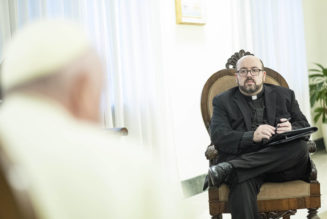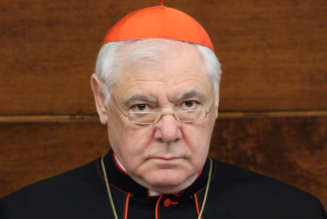By Dr. Jeff Mirus ( bio – articles – email ) | Jun 28, 2024
In a bizarre news story out of Belgium, a court has ruled that two Catholic bishops must pay financial damages to a woman who was denied a place in a training program for deacons. The logic of the ruling was that the Church’s teaching that only men can be ordained to the diaconate applies only to their ordination, not to admission to a training program which women might find to be otherwise useful.
In other words, the court finds no legal connection between admission to a form of training for a specific purpose and the ability to undertake that purpose. The Church apparently must train everyone who wants to be trained for any ordained ministry without reference to their ability to undertake that ministry.
The woman in question, who has long been a member of a lay-ministry team in a priestless parish, described herself as “a religious, socially committed, feminist, and ecologically inspired woman.” (And also a woman so committed to herself as to sue the Church.) Admittedly, Pope Francis himself has tried far too hard to identify ecological inspiration as a key to life everlasting: Eternal life at stake in environment crisis, Pope says. But Catholics do not become eligible for ordination by adhering to the agendas of the dominant culture, and this latest case in Belgium is both one more cultural restriction of Catholic mission and one more attempt to diminish the freedom of the Catholic Church.
Diminishing the Church
I suspect that everyone has noticed by now how far the powers of the State have encroached in the modern world on the powers of the Church. Or we might similarly notice that the authority of the State more and more clearly opposes the authority of the Church, which is to say the authority of Christ Himself. Throughout the West, we are now permitted to hold religious views only as a matter of personal sentiment, as long as it does not affect either our personal public behavior or our institutional actions.
Indeed, one of the greatest myths of our period in history is the myth that religious beliefs are mere personal sentiments. We are permitted to cling to these sentiments only as long as they do not affect our public actions or our social judgments. Indeed, they may not even affect our family life beyond the infusion of a form of sentiment that does not demand any counter-cultural moral commitments. But this is a judgment against authentic Christianity, which must inescapably develop into persecution and punishment, perhaps even to the point of death, for authentic Christians.
In effect, what the modern State enforces on Christians—and especially on members of a still highly visible Church—is a contemporary form of Nicodemism. I’ve mentioned this several times over the years: Nicodemism was the name given to religious dissemblers in the period of the tensions and even battles associated with the Protestant Revolt. Named for the famous disciple of Jesus who came to speak with Our Lord only by night, these sixteenth-century adherents believed in completely hiding their religious beliefs from everyone. This commitment was intense enough even to prevent the active formation of their own children.
Needless to say, as an identifiable sect Nicodemism died out very quickly, as it had no real means of self-perpetuation. But in our day, cultural pressure accomplishes the same thing without the telling name: Indeed, a great many secularized Catholics, who possess only a certain historical awareness of or nostalgia for the Church in which they were baptized, are so busy arranging their lives along the wholly secular lines accepted by the dominant culture that their children grow up without even a limited knowledge of what it means to be a member of the Church Christ established for the sake of our eternal salvation—and with no human possibility for effective attachment to it whatsoever.
Options…and more options
Over the past six or seven years, beginning with Rod Dreher’s idea of “the Benedict option”, a number of Catholic authors have chimed in on the question of what model should be conceptualized as the best way to orchestrate our lives and witness as Christians in an overwhelmingly secular world. Since then, I have seen articles explaining the Benedict option, the Francis option (for Pope Francis), the Jeremiah option, the David option, the Augustinian call, the other Benedict option (for Pope Benedict XVI), and the more useful “strangers in a strange land” approach offered by Archbishop Charles Chaput.
Some of these options offer keen insights, but perhaps the best contemporary modelling was done in the little book published by the University of Mary, From Christendom to Apostolic Mission, which several American bishops have distributed to all their priests. I commented on this book after one bishop did so; see Bishop Conley’s bid to foster apostolic Catholicism. Many of the other options on offer are designed to be the most convenient way to retain our own faith and that of our families; in other cases, the options are geared more toward the most effective way to evangelize; but in From Christendom to Apostolic Mission, there is the keenest recognition of the fundamental reality we all face in the West at the present moment.
What I mean is that one of the biggest single problems we have faced since the mid-twentieth century is the dislocation and dissociation caused by two realities: First, most of us can still remember (or at least as a matter of recent history are aware of) the massive public shift that occurred in the 1960s when Western public cultural habits were still largely and fairly frankly oriented toward Christian principles, even if they were overwhelmingly honored in the breach. Second, most of us are still bewildered by the rapidity of the cultural shift away from any public approval of these principles. This bewilderment has left us grasping at straws in the effort to find the key to “reversing” a rapidly accelerating trend.
Some would say—indeed, I would say—that this condition is graphically illustrated by American politics at the highest level, in which the nominally Catholic President Joseph Biden represents the triumph of secularism and the non-Catholic Donald Trump represents the best we can do in opposition. In addition to being a striking contemporary illustration of the Biblical advice, “Put not your trust in princes” (Psalm 146:3), this is also a warning that Catholics today (and indeed the Church herself) must forsake the “Christendom” model and return to their apostolic roots.
Only the Fidelity option
Much as I myself looked at the problem in “Christendom” terms in the immediate aftermath of the cultural collapse of the sixties, over time I have recognized that the crisis we face is not at its root an institutional crisis (though it is that) but rather a personal crisis arising from loss of Faith—that is, from infidelity—a crisis so severe that Christian fidelity is no longer even a point of reference for most Westerners today. More importantly still, Christian fidelity is no longer even a point of reference for many semi-practicing Catholics, though that problem is gradually being ameliorated in many places through both attrition and authentic ecclesiastical renewal.
In any case, once we recognize the nature and extent of the problem—that the old order is no longer retrievable but a new order must be built—we can begin to understand what has really happened historically. For roughly the past five hundred years, the most Catholic (and indeed “Churchy”) features of Western civilization have gradually been hollowed out by various developments, movements, and infidelities which left much intact in terms of public discourse and institutional shells, but little intact in terms of a living sacrificial faith—and of course there is no real faith that is not “living sacrificial”. This crisis was as true of the Church herself, in some ways, as it was more massively for the culture as a whole. This is also the real reason that the response to the Second Vatican Council was both generally chaotic and initially led by Catholic proponents of the dominant values of the secularized West—a condition from which the Church has gradually recovered, but only by some seventy years of fits and starts.
In other words, what we face today, rather than being the result of a fundamental crisis that suddenly occurred in the 1960s, came about simply because by the 1960s the evisceration of the once-Christian cultural core had reached the point at which it was broadly realized that the outward societal forms no longer matched what the vast majority of people believed and held dear. Thus the forms—the conventions, customs, laws, and bureaucratic operations of government and educational institutions—were rapidly reformulated on the basis of new cultural conventions, customs, laws, and bureaucratic methods deliberately formulated to protect and foster the West’s steadily evolving secularist preferences.
It is in the midst of this crisis, which has now been recognized, that the various “options”, or models of Christian survival and renewal, have been proposed. But without any possible doubt, the biggest cultural adjustment required of Catholics under these circumstances is that we accept the loss of a “Christendom” culture in which the laws and conventions, despite many human sins and failings, at least paid lip service to God’s revelation through Christianity and the natural law. It is in making precisely this sort of mental and spiritual adjustment that we find ourselves once again bearing witness to the Faith under conditions very like those that prevailed in the age of the early Christians, that is, the age of the apostles.
Conclusion
In other words, what is demanded of us now is not a conventional outward pattern of life in accordance with an evolved Christian cultural system, for apart from the Church herself, such a cultural system no longer exists. Rather, what is demanded of us is a profoundly unconventional and even personally risky fidelity to Christ and the Church, a fidelity which must be lived creatively, and to some legitimate extent designed to avoid various sorts of martyrdom, but never in those dissimulating ways (remember Nicodemism!) through which we avoid detection simply by continuously failing to externalize our inner Christian fidelity. After all, anything like that is simply self-deception.
We must remain witnesses to the light, even if it must be more often by our personal way of life than by our socio-political actions and victories. This is, perhaps, the fundamental difference between the Christendom principle and the apostolic principle. In doing so, we will learn very quickly that there is a social cost, for the inescapable reason that those who do evil hate the light, as St. John wrote when commenting on Christ’s entry into the world (3:20). But it is only in habitually failing to bear a personal witness that we will fail to increase that light; just as it is only by bearing that personal witness that we will allow the light of Christ—if it be God’s will for us now—to begin once again to reshape an entire culture.
This suggests that we should worry far less about “the culture” than we do about the souls of those with whom we interact. The problem is not a matter of wholesale change, but of each one living faithfully within his own sphere of influence. After all, even if this does in time result in a major cultural shift, such a culture will always be a fragile one—just as Christendom, as brilliant as its achievements were in some ways, was always infected with personal and cultural sins which marked it indelibly as a human culture. For no “Christendom” on this earth is the New Jerusalem—and as soon as any Christianized culture takes itself for granted, it is doomed. Who can doubt, then, the wisdom of Providence in allowing us to understand this great human civilizational truth, once again, in our own time?
Sound Off! CatholicCulture.org supporters weigh in.
All comments are moderated. To lighten our editing burden, only current donors are allowed to Sound Off. If you are a current donor, log in to see the comment form; otherwise please support our work, and Sound Off!

There are no comments yet for this item.










